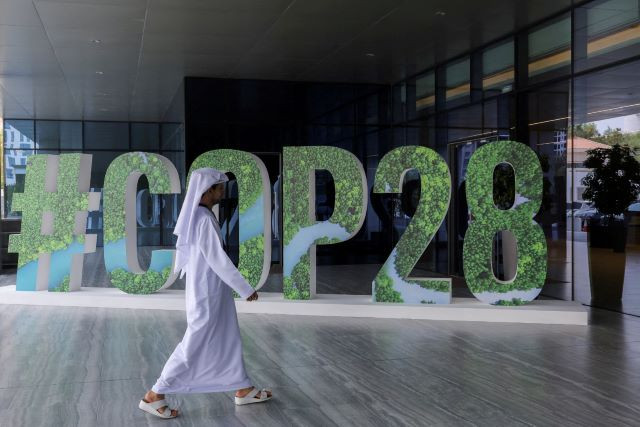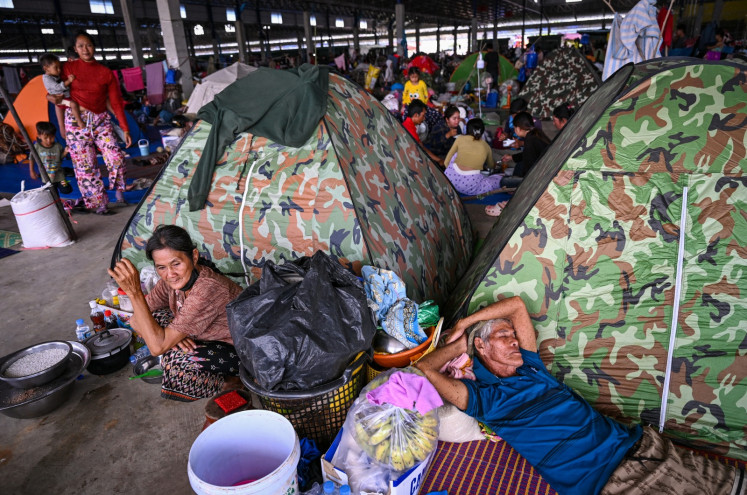Popular Reads
Top Results
Can't find what you're looking for?
View all search resultsPopular Reads
Top Results
Can't find what you're looking for?
View all search resultsCoal, oil, and gas are fueling the cost-of-living crisis
Subsidies fail to protect the real incomes of the poorest households and divert money that are increasing developing country debt burdens.
Change text size
Gift Premium Articles
to Anyone
 March on: A man walks past a “#COP28“ sign on Oct. 1, 2023 during The Changemaker Majlis, a one-day CEO-level thought leadership workshop focused on climate action, in Abu Dhabi, the United Arab Emirates. The city will host the United Nations climate conference at the end of this month. (Reuters/Amr Alfiky)
March on: A man walks past a “#COP28“ sign on Oct. 1, 2023 during The Changemaker Majlis, a one-day CEO-level thought leadership workshop focused on climate action, in Abu Dhabi, the United Arab Emirates. The city will host the United Nations climate conference at the end of this month. (Reuters/Amr Alfiky)
O
ver the last couple of years inflation has caused a cost-of-living crisis across large parts of the world. Some fearmongeres have used the hardship this has caused billions of people to propagate rhetoric that climate change action is unaffordable and running against the interests of ordinary people. Nothing could be further from the truth.
Propagating a Green vs. Poor narrative is divisive, and it is often used to mask short-term, profit-driven self-interest. The only stable, economically sustainable future is one of energy security, resilience to disasters, well-funded coordinated recovery from them, and ultimately a cap on temperature rise at 1.5 degrees centigrade.
Fossil fuels, including coal, oil, and gas are a major driver of the cost-of-living crisis, which is stretching billions of household budgets to breaking point. Prices have swung wildly, as they frequently do, driven higher by uncertainty and conflict. In turn, this pushes up the costs of transport, food, electricity, and basic household necessities. In some heavily fossil fuel-dependent countries, household bills rose as much as US$1000 in 2022 due to fossil fuel energy costs.
Consumer costs will rise even further and economic growth will slow as climate impacts become more intense, according to economic authorities, such as the United States Treasury, the Reserve Bank of India and the European Central Bank. High energy prices also shrink profit margins for businesses and hurt economic growth. High energy prices also shrink profit margins for businesses, hurt economic growth, and impede the right to energy access across the world. Inflation hurts the poorest households the most.
This comes as climate disasters are also getting worse in every country. This year will likely be the hottest for 125,000 years. More destructive storms, unpredictable rains and floods, heatwaves, and droughts are already causing massive economic damage and affecting hundreds of millions of people across the world, costing them their lives and livelihoods.
The fossil fuel taps can’t be turned off overnight but there are a lot of opportunities for action not currently being taken. For example, in 2022, governments spent over $7 trillion in taxpayers’ money or borrowings on fossil fuel subsidies.
Subsidies fail to protect the real incomes of the poorest households and divert money that are increasing developing country debt burdens, or could have been used to improve health care, build infrastructure – including renewable energy and grids – and expand social programs to alleviate poverty. Done responsibly, a phase-out of such subsidies would actually help the poorest and improve the economies of the countries now dependent on them.
This year, at United Nations Climate Change, we conducted a Global Stocktake on climate action up to now. It has indicated clearly that progress is too slow. But it also revealed that there are many tools we have to speed up climate action now, which will simultaneously build stronger economies. We have the knowledge and tools to accelerate this transition while ensuring it is fair and just, leaves no one behind.
Billions of people need their governments to pick up this toolbox and put it to work. That includes switching billions of dollars from investments in new fossil fuel production to renewable energy that will provide stable, reliable and lower-priced energy to propel economic growth. This is about both demand and supply. Those of us that demand energy to turn our lights on need to be provided with clean options to do it, and the fiscal space to invest in our communities and their ability to adapt to the changing world.
There is cause for optimism, if governments come to this year’s climate change conference – COP28 – in Dubai with a spirit of cooperation and a laser-focus on solutions.
At COP28 we can agree on tripling the world’s renewable energy capacity. We can double energy efficiency. We can show we are doubling finance to help countries adapt to climate impacts and center it in national planning. We can make the climate loss and damage fund a reality that helps deliver climate justice. And we can deliver old promises on financing the transition, and outline how we are going to fund the next steps.
One moment, one meeting, won’t change everything. But we can capture the future in the directions that we set this year, and provide the plan for how national commitments can deliver in 2025.
I refuse to let fearmongering pull a hood over my eyes, and you shouldn’t either.
***
The writer is United Nations Climate Change executive-secretary.










